In a world where modernity often reigns supreme, the allure of charming small farmhouse kitchens offers a refreshing escape to a simpler time. These cozy culinary spaces, bursting with character and warmth, serve not only as functional hubs for cooking but also as inviting gathering spots for family and friends. With their rustic touches, vintage accents, and clever design solutions, small farmhouse kitchens epitomize a perfect blend of style and practicality. In this article, we will explore the elements that make these kitchens so enchanting—from reclaimed wood finishes to open shelving displays—and how they remind us that true beauty often lies in the details. Join us as we journey through the heart of the farmhouse, discovering how these charming kitchens harmoniously balance aesthetics with everyday functionality.
The Timeless Appeal of a Farmhouse Kitchen Design
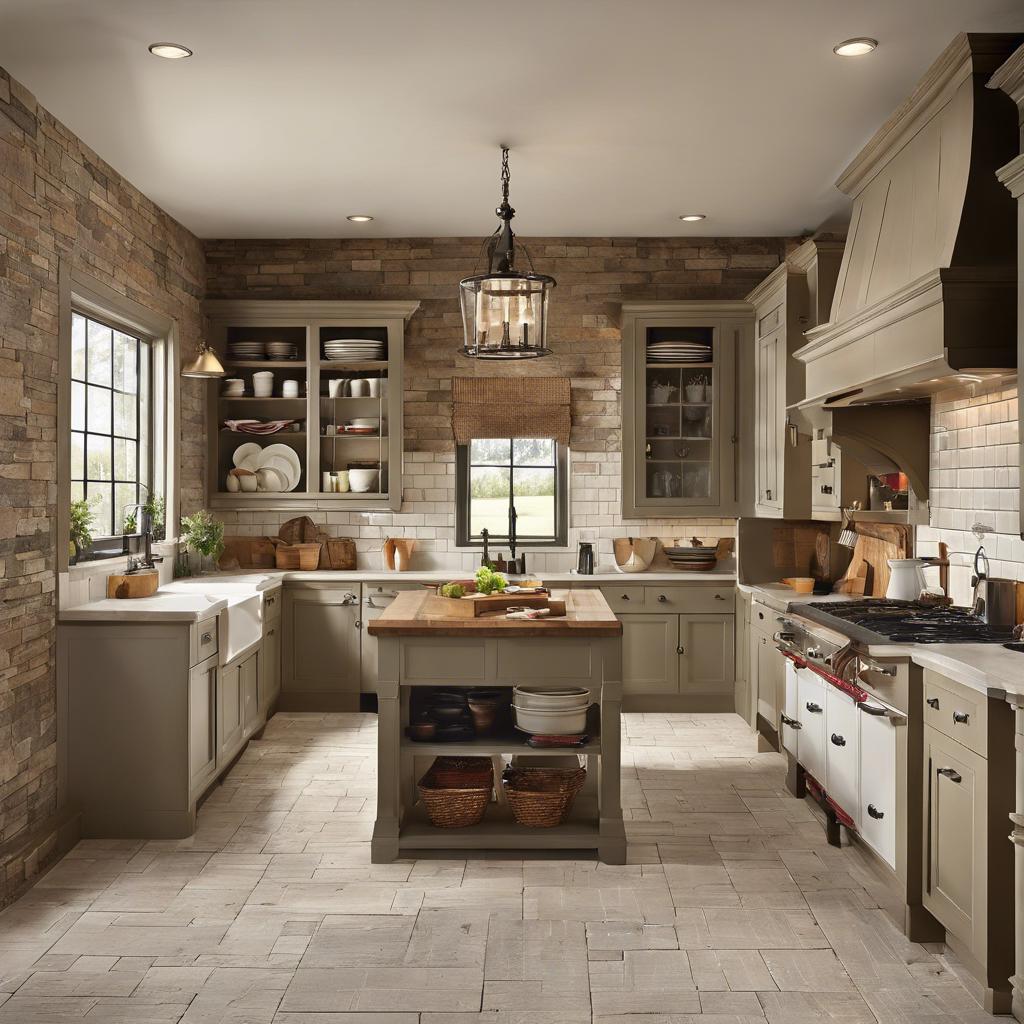
The allure of a farmhouse kitchen design lies in its perfect harmony of rustic charm and contemporary comfort. These kitchens evoke a sense of nostalgia while also providing modern functionality, making them a favorite choice for many. Key elements, such as exposed beams, shaker cabinets, and vintage appliances, contribute to a warm atmosphere that invites families to gather and create memories. Additionally, a well-thought-out layout maximizes space and encourages movement, which is essential in the heart of the home. Elements like comfortable seating areas and open spaces foster an environment that feels expansive yet intimate.
Incorporating natural materials enhances the aesthetic and durability of these kitchens. The use of wooden countertops, subway tiles, and farmhouse sinks creates a cohesive look that celebrates the beauty of the countryside. Furthermore, a color palette featuring soft whites, earthy tones, and muted pastels keeps the space bright and inviting. To help you visualize the charm and functionality of small farmhouse kitchen designs, here’s a simple comparison of key features:
| Feature | Benefits |
|---|---|
| Open Shelving | Promotes accessibility and showcases decorative items. |
| Large Islands | Provides extra prep space and acts as a gathering point. |
| Natural Light | Enhances mood and makes the kitchen feel more spacious. |
| Farmhouse Sink | Combines style with practicality for deep cleaning. |
Embracing Rustic Charm in Small Spaces
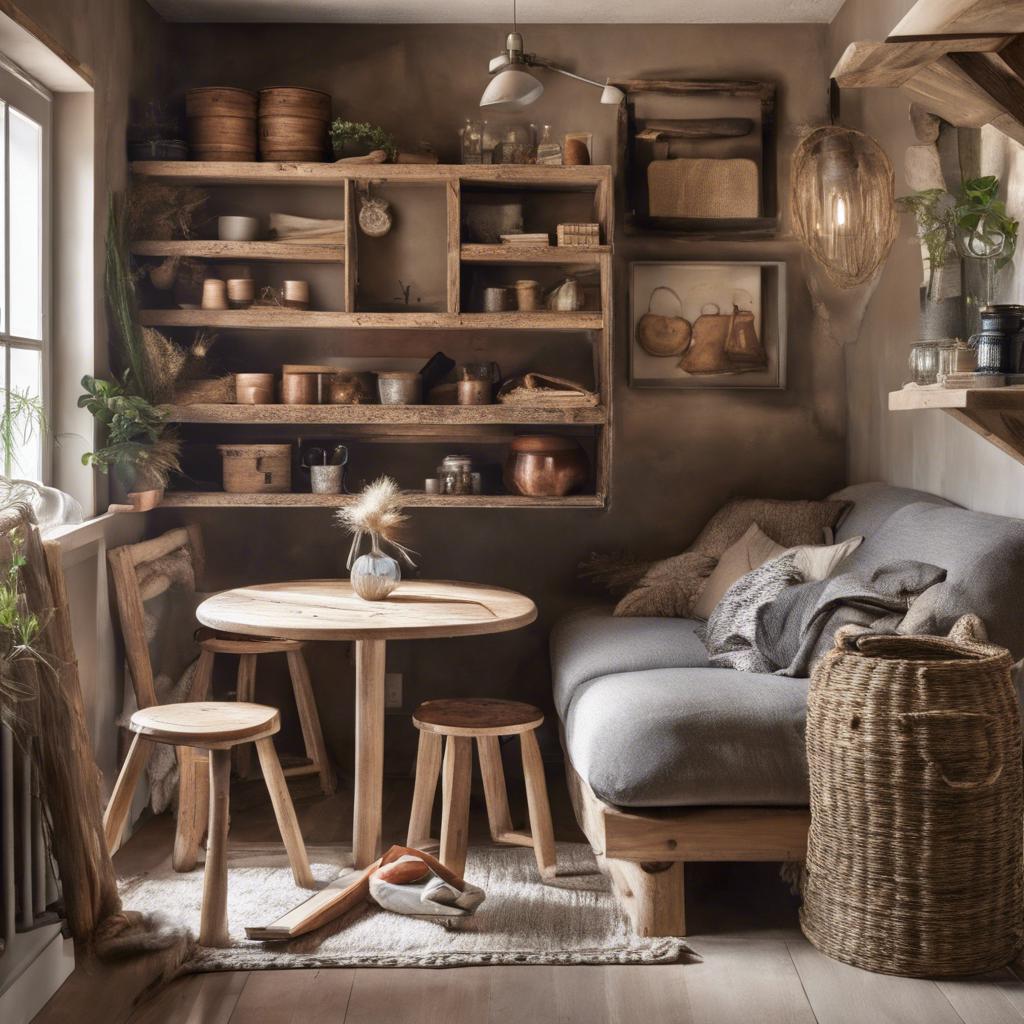
In small farmhouse kitchens, embracing rustic charm often starts with incorporating natural materials and earthy colors. Wooden beams, shiplap walls, and chunky farmhouse tables create an inviting atmosphere that harkens back to simpler times. Consider using a palette of soft whites, muted greens, and warm browns to enhance the cozy vibe. Accents like vintage utensils, antique dishware, and handmade pottery can further enrich the space while serving as both functional items and decorative pieces. A well-placed hanging pot rack or a collection of mason jars filled with fresh herbs can instantly add character without overwhelming the limited space.
To make the most of these intimate settings, it’s essential to combine style with smart storage solutions. Open shelving not only displays your favorite kitchenware but also makes it easily accessible, adding to the farmhouse feel. Integrating multifunctional furniture, such as a kitchen island with integrated seating or a fold-down table, optimizes space while maintaining a charming aesthetic. You might also consider adding a simple wall-mounted pot rack to keep pots and pans within reach, ensuring everything you need is close at hand while still showcasing your rustic style. Embracing these ideas will help create a warm, functional kitchen that embodies the heart of farmhouse living.
Choosing the Right Color Palette for a Farmhouse Kitchen
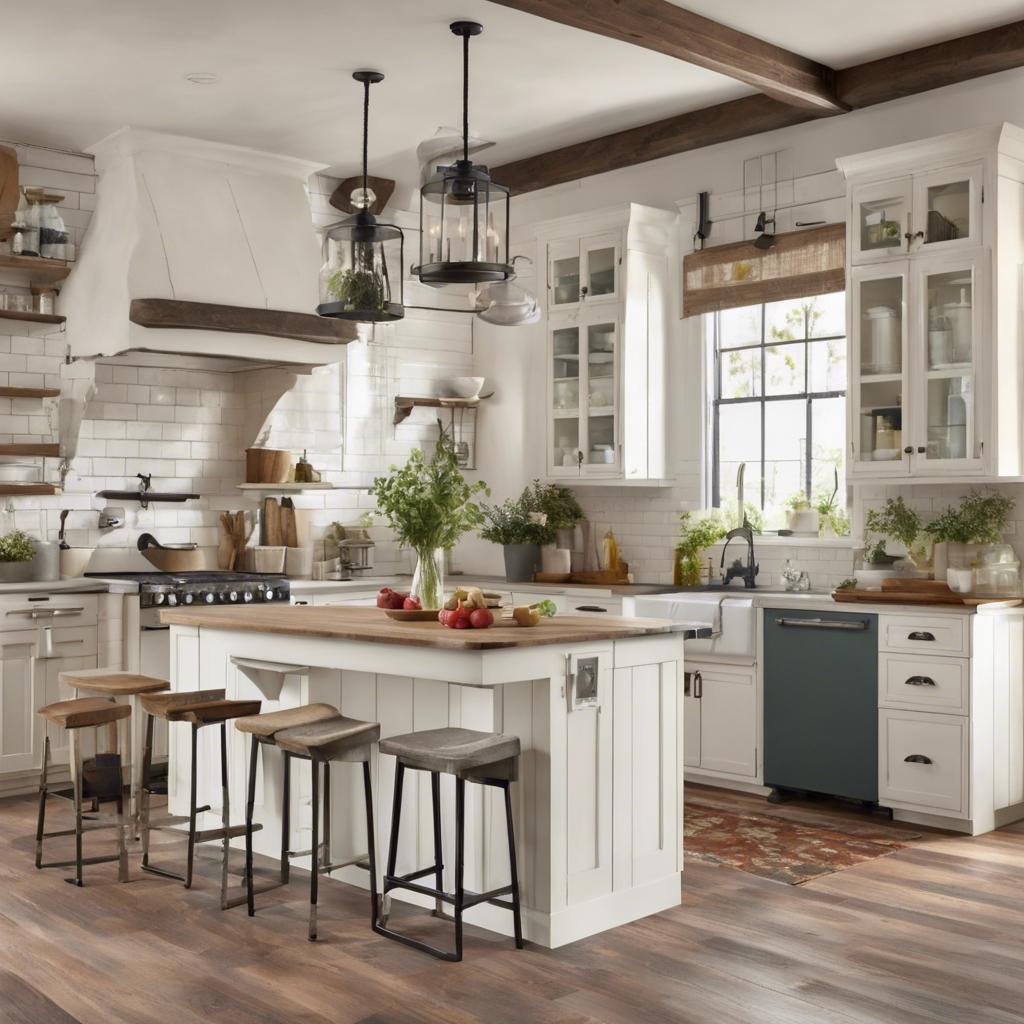
When selecting a color palette for your farmhouse kitchen, consider how colors can evoke warmth and coziness. A classic choice is a mix of soft whites, creamy beiges, and gentle grays, which can create a light and airy atmosphere. These neutral tones serve as a perfect backdrop for rustic elements and can be easily complemented with bolder accents. Incorporating pastel shades of blue, green, or yellow can infuse a touch of charm while still adhering to the farmhouse vibe, allowing you to maintain a balance between aesthetics and practicality.
In addition to traditional colors, integrating natural shades inspired by the outdoors can enhance the thematic authenticity of a farmhouse kitchen. Consider using earthy olive greens, muted browns, and soft terracotta shades that mirror nature’s palette. Pair these earthy tones with natural materials like wood and stone to create a cohesive look. To assist in your color selection, refer to the table below for inspiration on combinations that work harmoniously together:
| Base Color | Complementary Accent Color | Suggested Natural Element |
|---|---|---|
| Soft White | Dusty Blue | Light Wood |
| Creamy Beige | Muted Olive | Stone Accents |
| Warm Gray | Rusty Terracotta | Brick Highlights |
Maximizing Storage Solutions in a Cozy Farmhouse Kitchen
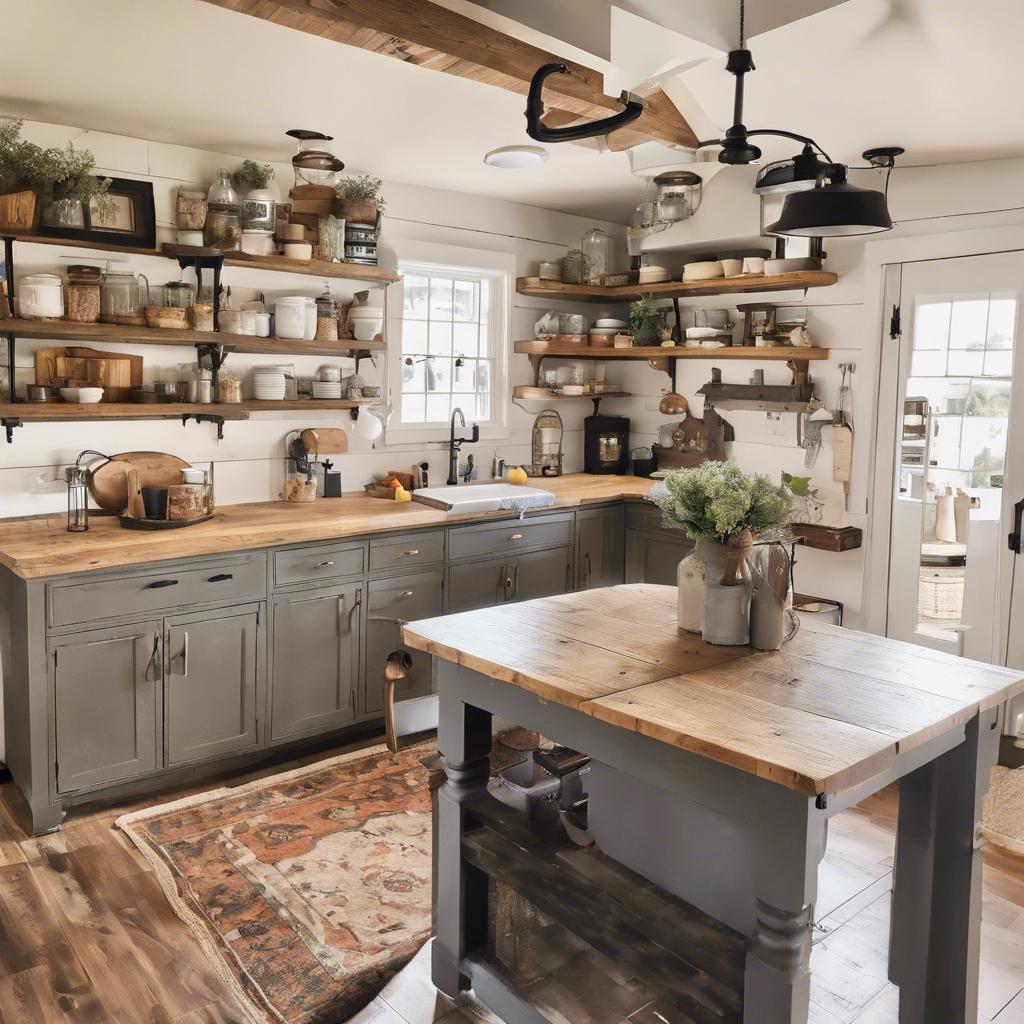
In a cozy farmhouse kitchen, finding effective storage solutions can transform even the smallest of spaces into highly functional areas. Embrace the charm of open shelving to showcase beautiful dishware and rustic decor, which not only adds character but also keeps essentials easily accessible. Utilizing baskets and bins on shelves can help organize smaller items while adding a touch of warmth to the overall décor. Consider repurposing vintage crates or wooden boxes for additional storage; they serve as both decorative elements and practical organizers, making it easy to keep herbs, spices, and pantry items neatly arranged.
Another practical approach is to maximize vertical space with clever storage hacks, like installing wall-mounted pot racks and hooks. This solution keeps cookware within reach and frees up cabinet space for other essentials. Incorporate drawer dividers or organizers for utensils to ensure everything has its place while remaining stylishly tucked away. To enhance your kitchen’s functionality, a compact island can double as additional workspace and provide storage underneath; open shelves or cabinets can hold bulk items and small appliances, maintaining the cozy feel of the farmhouse aesthetic without compromising on practicality.
Essential Features of an Inviting Farmhouse Kitchen
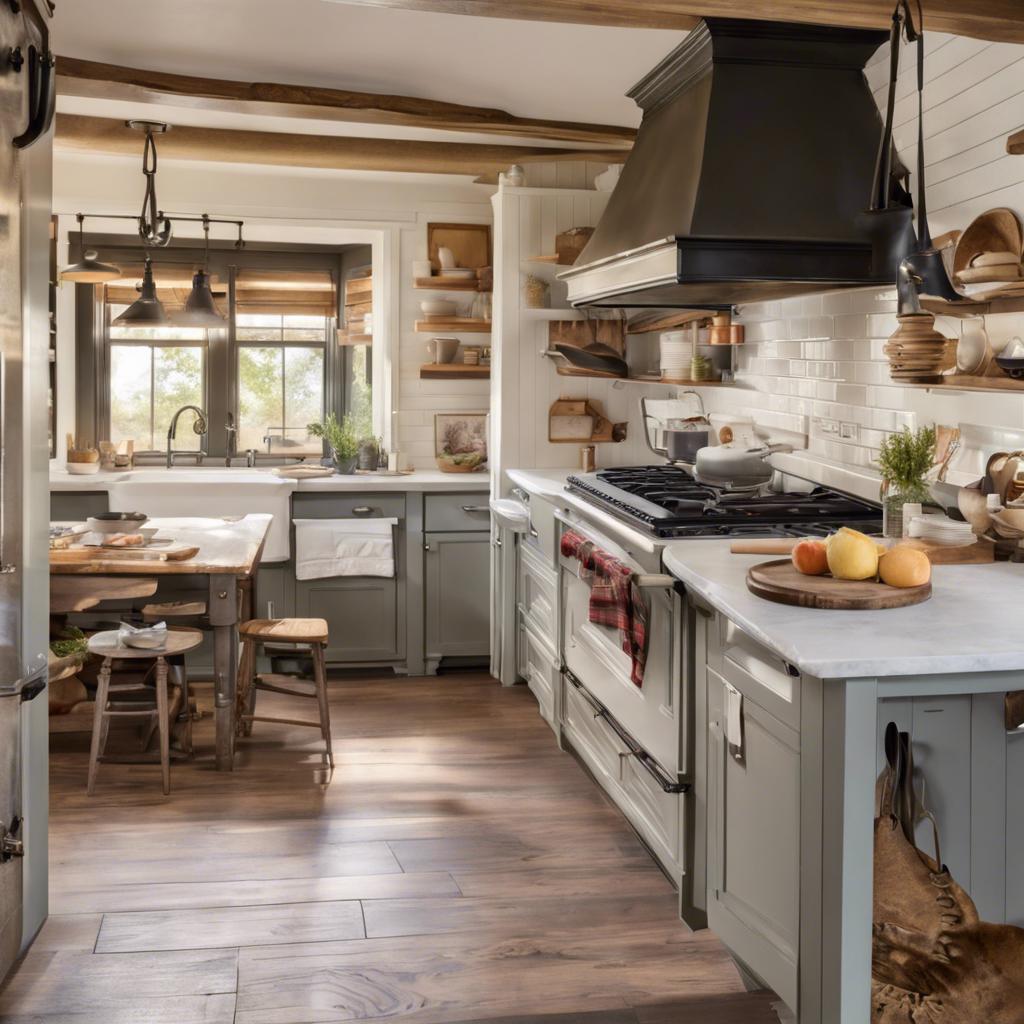
The heart of an inviting farmhouse kitchen lies in its ability to blend warmth with functionality. Natural light plays a crucial role; large windows not only illuminate the space but also connect it to the surrounding landscape. Pair this with open shelving that displays charming dishware and homemade preserves, creating an atmosphere that feels personal and welcoming. Incorporating a large wooden table becomes a focal point, perfect for family gatherings or casual meals, while vintage accents like a classic farmhouse sink can evoke nostalgia and charm.
Storage solutions should marry style with practicality. Opt for built-in cabinets with a distressed finish, adding character while maximizing space. Incorporating a mix of textures—like smooth granite countertops paired with rustic wood finishes—creates visual interest and warmth. Don’t forget to add greenery; potted herbs on the windowsill or hanging plants breathe life into the kitchen, making it not just a space for cooking, but a cheerful hub for family interaction. Consider adding a small table to display seasonal décor, enhancing both style and functionality.
Sustainable Materials for Your Farmhouse Kitchen
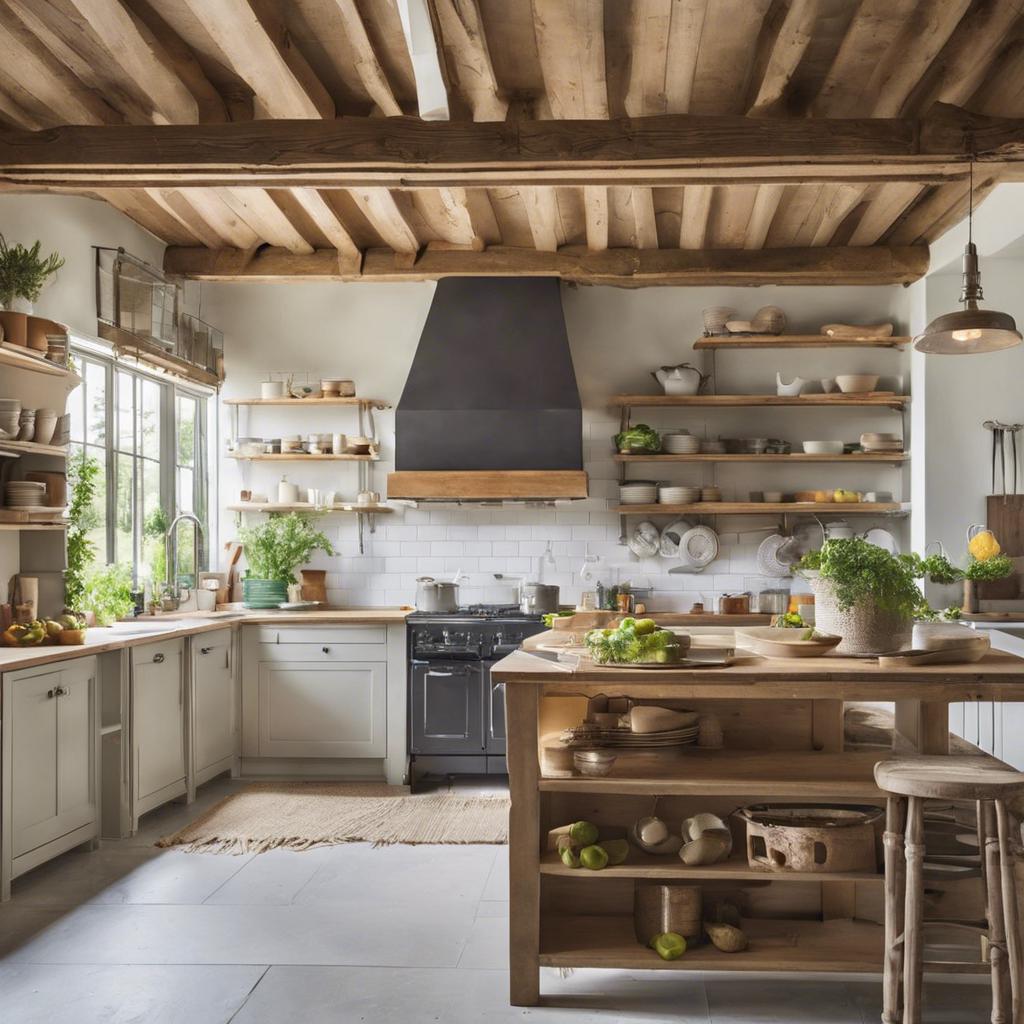
Creating a warm and inviting atmosphere in your kitchen can be effortlessly achieved with the right materials. Opting for reclaimed wood for cabinetry and countertops not only contributes to a rustic aesthetic but also minimizes environmental impact. Additionally, bamboo is an excellent choice due to its rapid growth cycle and durability, making it a sustainable alternative for shelving or flooring. Emphasizing natural fibers, you can incorporate hemp or linen for kitchen textiles like curtains, aprons, and tablecloths, enhancing both comfort and sustainability.
When it comes to appliances and fixtures, consider selecting stainless steel or ceramic, which are both long-lasting and recyclable options. For those looking to enhance energy efficiency, incorporating low-VOC paints and finishes will ensure a healthier home environment. To illustrate, here’s a comparison of some sustainable materials and their benefits:
| Material | Benefits |
|---|---|
| Reclaimed Wood | Environmentally friendly, unique aesthetic |
| Bamboo | Fast-growing, durable, and versatile |
| Stainless Steel | Long-lasting, recyclable, modern look |
| Low-VOC Paints | Healthier indoor air quality, eco-friendly |
The Heart of the Home: Creating Warm Gatherings in a Farmhouse Kitchen
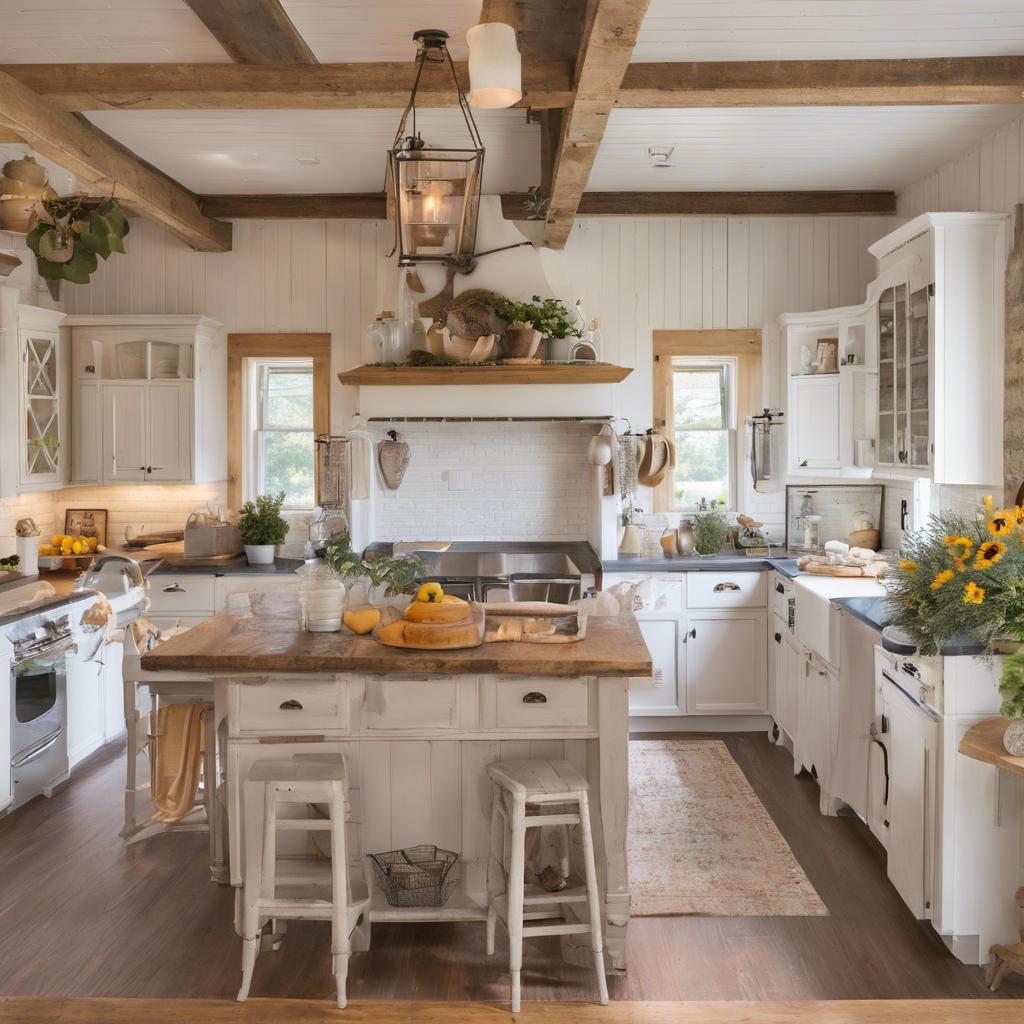
In a cozy farmhouse kitchen, the heart of every gathering, the atmosphere is infused with warmth and love. It’s a space where cherished recipes are passed down through generations, enveloping everyone in nostalgia. To create an inviting environment, consider these elements:
- Natural Materials: Incorporating wood accents and stone countertops adds a rustic charm.
- Soft Lighting: Use pendant lamps or vintage chandeliers to cast a warm glow during evening meals.
- Functional Layout: An open concept encourages interaction, making cooking a communal experience.
The decor can enhance the ambiance further, providing a perfect backdrop for laughter and storytelling. Add personal touches such as:
- Handmade Pottery: Unique dishware can bring character to your dining table.
- Herb Gardens: A small window sill garden not only looks beautiful but also provides fresh ingredients.
- Family Photos: Displaying cherished memories adds a sense of history and connection.
Incorporating Vintage Accents in Your Farmhouse Kitchen
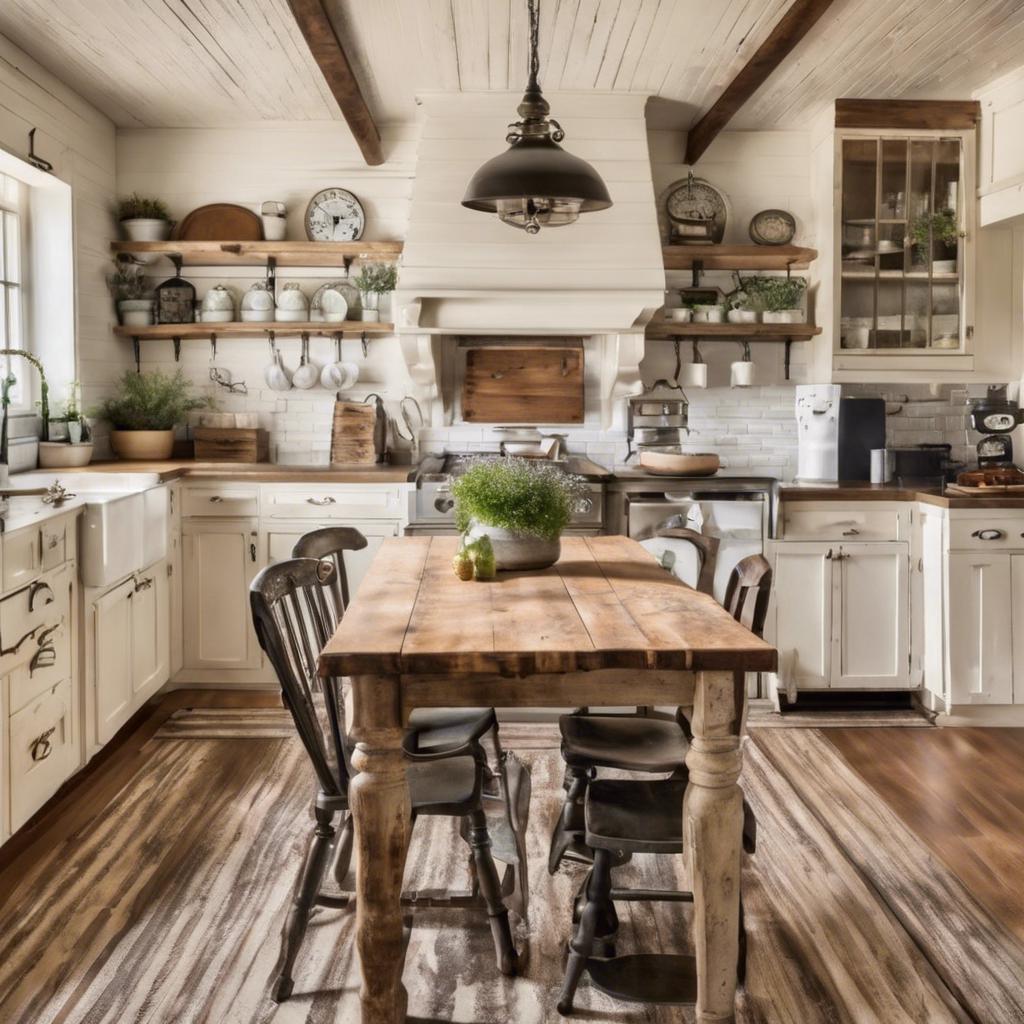
Incorporating vintage accents can transform a small farmhouse kitchen into a timeless masterpiece. Start by selecting a color palette that blends warm, muted tones typical of vintage decor with the rustic feel of farmhouse aesthetics. Consider adding elements like an antique wooden table or retro-inspired bar stools to enhance the space’s charm. To draw the eyes upward, hang vintage cookware or an old wooden spice rack on the walls, creating visual interest while maintaining functionality. Pair these classic pieces with modern appliances to strike a balance between old-world charm and contemporary convenience.
Textiles are another great way to infuse vintage vibes into your kitchen. Look for table linens, dish towels, and curtains featuring timeless patterns such as checks or florals. Mixing these with distressed finishes, such as a farmhouse sink or reclaimed wood shelves, can anchor the overall design. You can even create a vintage plate gallery by arranging mismatched heirloom plates on a wall, which not only showcases your collection but also adds a unique touch that speaks to your personality. Remember, it’s all about blending the old with the new to achieve a harmonious and inviting space.
The Role of Natural Light in Enhancing a Farmhouse Kitchen
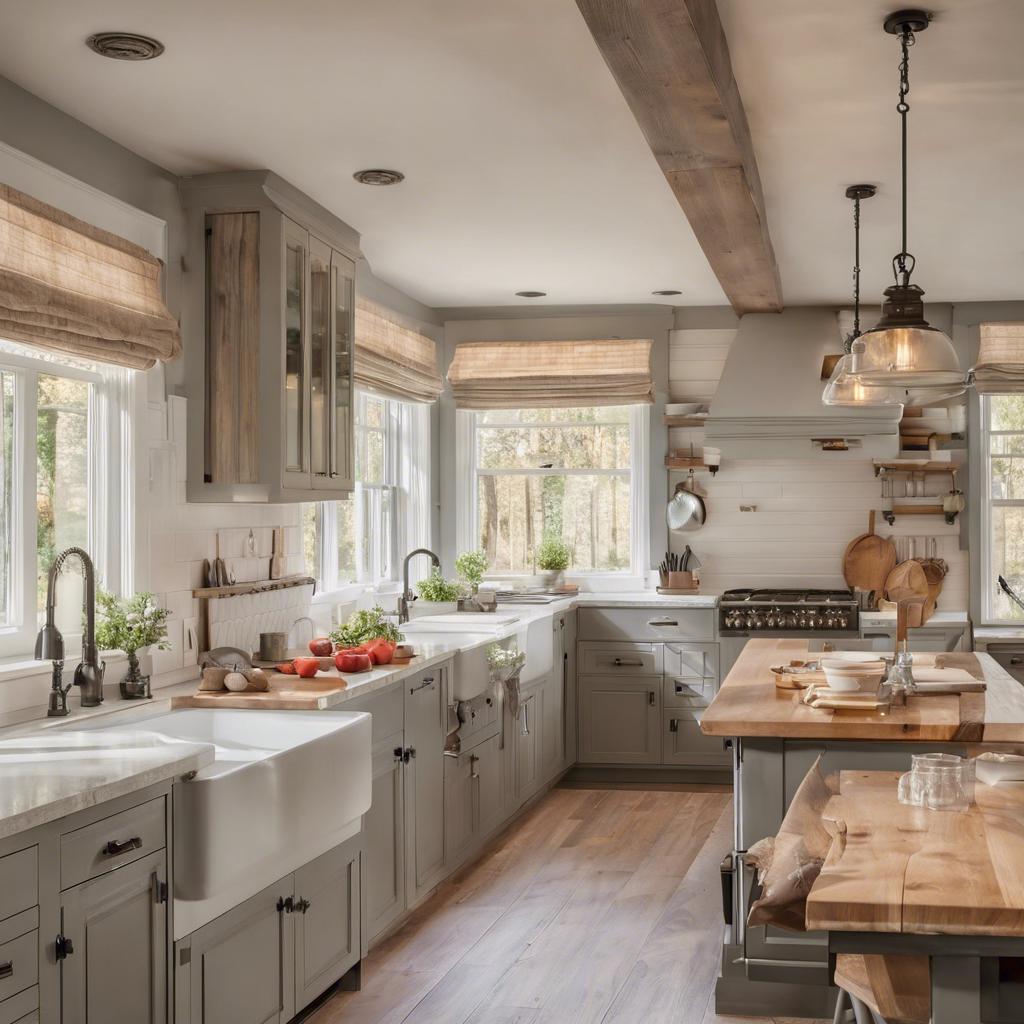
Natural light serves as a transformative element in a farmhouse kitchen, elevating its character while also enhancing its functionality. The warm, inviting glow that pours in from large windows or skylights not only brightens the space but also highlights the rustic charm of wooden beams and farmhouse-style cabinetry. Incorporating elements like glass-front cabinets and open shelving allows light to dance off glassware and decor, creating a welcoming ambiance. This abundance of light fosters a sense of well-being, making cooking and social gatherings feel even more enjoyable.
Moreover, the strategic placement of windows can improve energy efficiency and reduce the dependence on artificial lighting. During the day, the sun’s rays can naturally warm up the kitchen, contributing to a cozy atmosphere. Consider the following benefits of natural light:
- Enhanced Mood: Exposure to natural light has a positive effect on mental well-being.
- Better Visibility: Increased light helps in food preparation and enhances kitchen aesthetics.
- Energy Savings: Reduces reliance on electric lighting, lowering energy costs.
- Connection to Nature: Views of the outside environment create a soothing atmosphere.
Incorporating these elements thoughtfully can lead to a kitchen space that feels both functional and charming, seamlessly blending lifestyle needs with aesthetic appeal. With the right balance, natural light becomes a key player in the overall design narrative of a farmhouse kitchen.
Choosing the Perfect Farmhouse Kitchen Sink
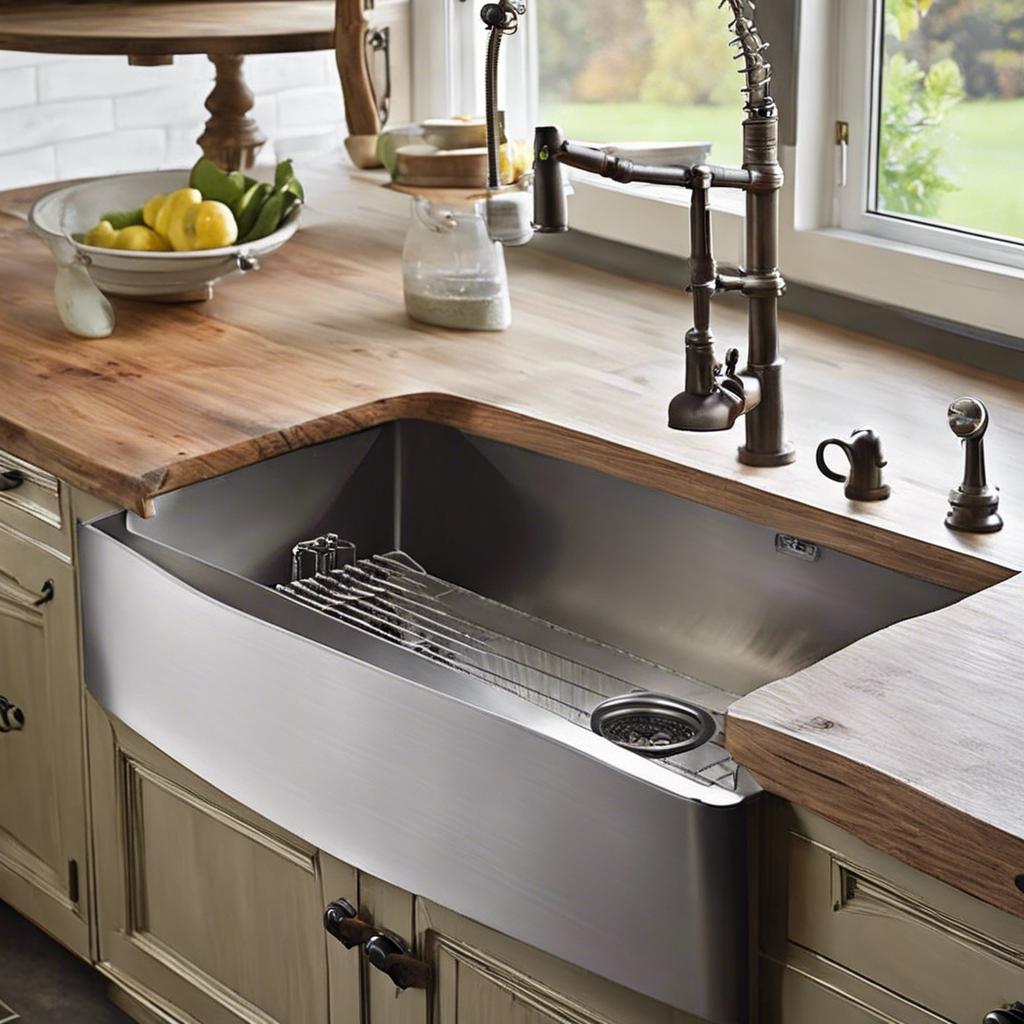
When selecting a kitchen sink for your charming small farmhouse kitchen, consider a few key elements to enhance both functionality and aesthetics. Material plays a crucial role; opt for robust options like porcelain, stainless steel, or fireclay that can withstand daily use while complementing your decor. Each material offers a unique finish, from the glossy allure of porcelain to the sleek modernity of stainless steel. Additionally, think about the size of your sink. A large, deep basin can handle everything from pots to vegetables, while preserving valuable counter space in a smaller kitchen.
Don’t forget to contemplate the style of the sink itself. Farmhouse sinks typically feature an apron front, providing a distinct character that resonates with rustic charm. To further personalize your choice, explore finishes and colors that align with your overall design. A classic white sink can offer a timeless feel, while a bold hue might add a playful touch. Furthermore, accessorizing your sink area with complementary faucets and fixtures enhances the functionality while elevating the kitchen’s style. Remember, each choice contributes not just to practicality but also to the inviting ambiance that defines a perfect farmhouse kitchen.
| Material | Durability | Style |
|---|---|---|
| Porcelain | High | Classic |
| Stainless Steel | Very High | Modern |
| Fireclay | High | Rustic |
Stylish yet Practical: Farmhouse Kitchen Fixtures
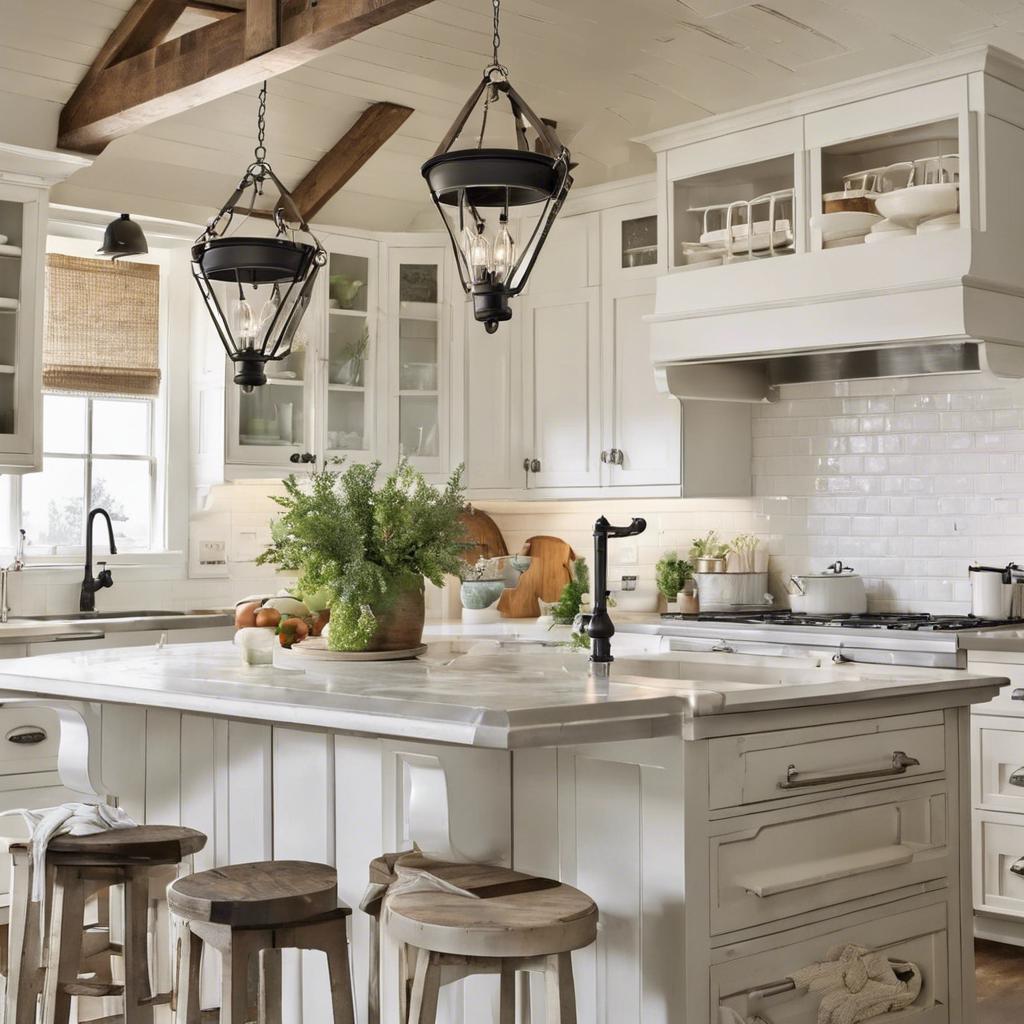
In a small farmhouse kitchen, where every square inch counts, choosing the right fixtures can enhance both the aesthetic appeal and functionality of the space. Consider vintage-inspired faucets with elegant curves and antique finishes; they provide a charming focal point while ensuring practicality. Alongside them, opt for deep, farmhouse-style sinks that not only look appealing but also accommodate everything from washing large pots to rinsing fresh produce. These elements cleverly merge style with utility, making daily kitchen tasks feel effortless and enjoyable.
Moreover, integrating suspended light fixtures can illuminate the kitchen while adding an inviting warmth. A combination of rustic chandeliers and pendant lights creates a cozy atmosphere, perfect for family gatherings or morning coffee rituals. Don’t shy away from materials like reclaimed wood or brushed metals; they offer durability without compromising on visual flair. To further streamline your kitchen’s functionality, you can explore:
- Open shelving: Showcasing beautiful dishware while keeping essentials within reach.
- Magnetic knife strips: For easy access to cooking tools while maintaining counter space.
- Smart storage solutions: Like pull-out pantry shelves that maximize space efficiency.
Open Shelving Ideas for a Chic Farmhouse Kitchen
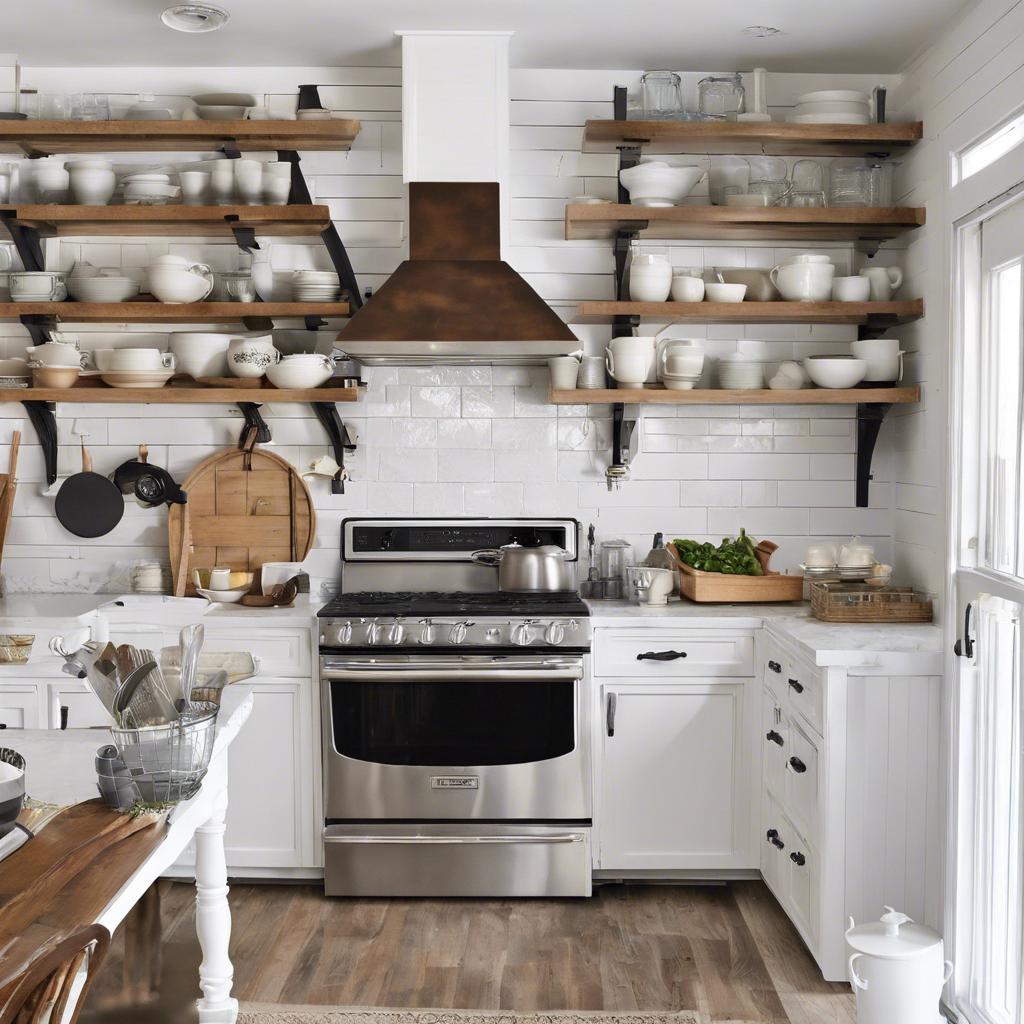
Open shelving is the perfect way to add both style and function to a farmhouse kitchen. With a focus on keeping things uncluttered yet beautifully displayed, consider incorporating a mix of different materials and heights. For example, wooden shelves can introduce warmth while metal brackets offer a modern edge. Layering various sizes of ceramic dishes, glass jars, and rustic cookbooks not only showcases your favorite items but also enhances the aesthetic appeal of the space. Additionally, don’t shy away from greenery; herbs in terracotta pots or small succulents can provide an inviting touch.
Another design tip is to create a theme or color palette that resonates with your overall kitchen decor. Think about utilizing a cohesive color scheme, for instance, pairing white dishes with soft pastel accents or mixing dark woods with light-colored accessories. A well-organized open shelf serves not just as storage but as a visual delight. Here’s a simple table to inspire your shelving style:
| Item | Style | Functionality |
|---|---|---|
| Ceramic Utensil Holders | Rustic | Storage for kitchen tools |
| Glass Spice Jars | Modern | Easy access to seasonings |
| Vintage Cookbooks | Charming | Decor and inspiration |
| Hanging Plants | Natural | Fresh herbs and decor |
A Guide to Farmhouse Kitchen Flooring Options
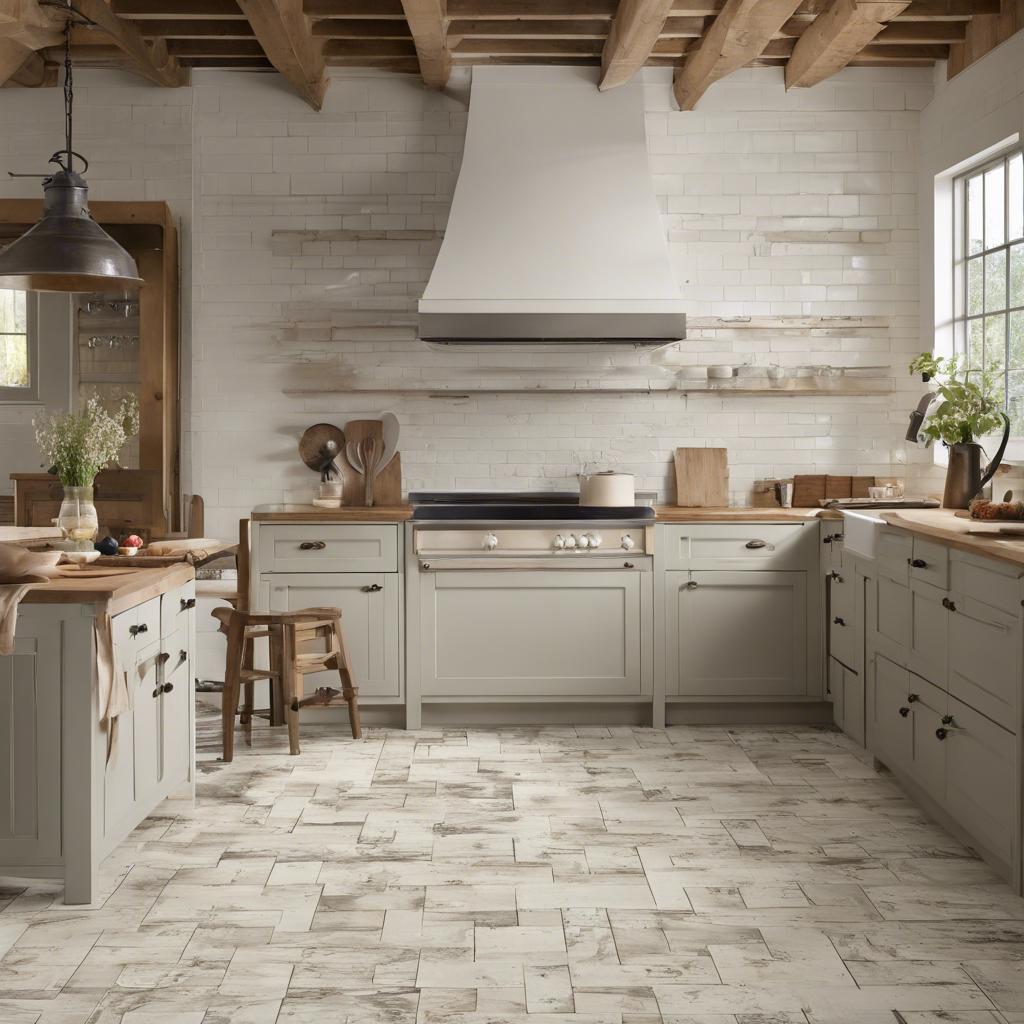
Choosing the right flooring for a small farmhouse kitchen is essential not just for aesthetics, but also for functionality. Traditional wood floors exude warmth and charm, making them a top choice for farmhouse designs. However, they require maintenance to protect against moisture and scratches. Consider engineered hardwood as an alternative; it’s more resistant to humidity changes while still offering the desired rustic appeal. Other excellent choices include natural stone and ceramic tiles, which provide durability and are available in various earthy tones and patterns that can enhance the farmhouse aesthetic.
For those who prioritize ease of care, vinyl flooring has made remarkable advancements in design, mimicking the look of wood or stone with added resilience. It’s also softer underfoot, making it ideal for bustling kitchens. If you prefer a more budget-conscious option, laminate flooring can provide the same charm with reduced upkeep. When deciding on your flooring, take into account:
- Style: Does it complement the overall kitchen design?
- Durability: Will it withstand daily wear and tear?
- Maintenance: How much time are you willing to invest in upkeep?
This careful consideration will lead you to the perfect flooring that marries beauty and practicality.
Creating a Functional Layout in a Small Farmhouse Kitchen
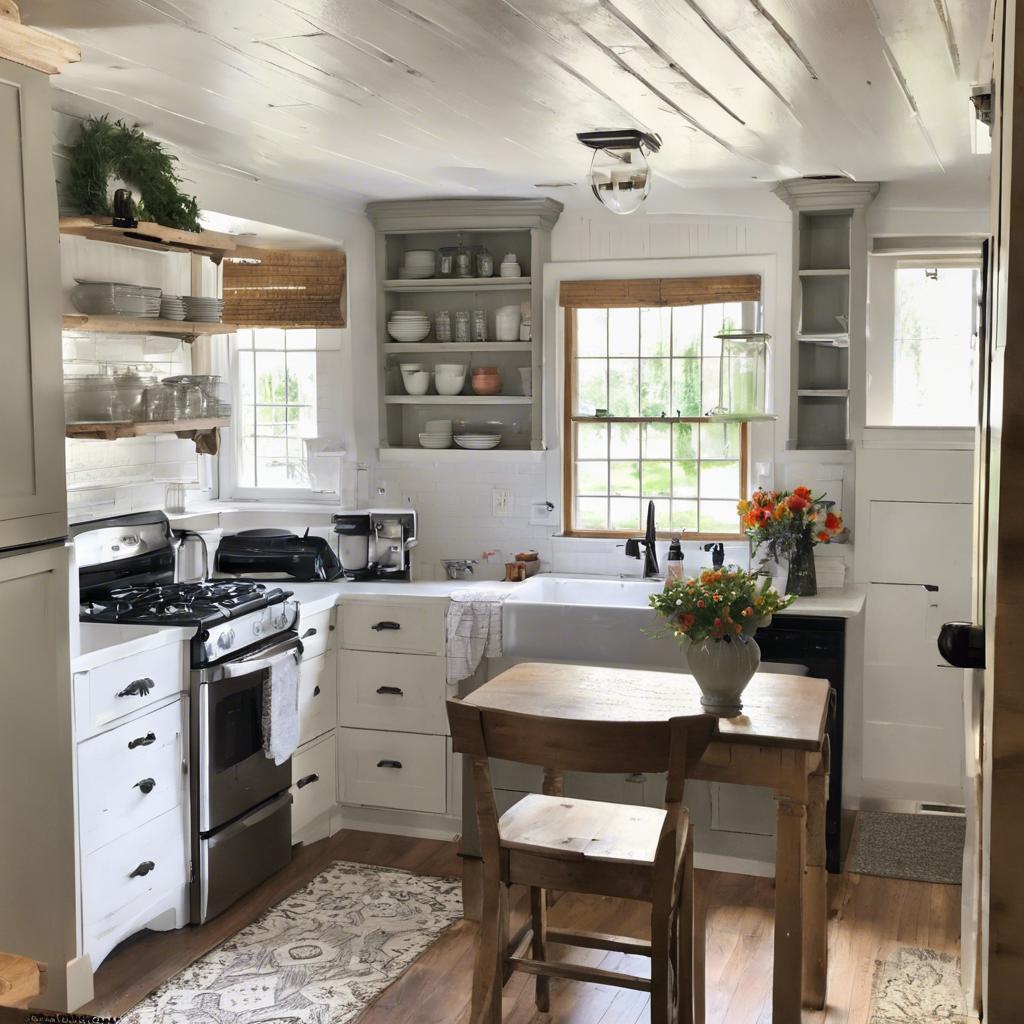
Maximizing functionality in a small farmhouse kitchen doesn’t mean sacrificing style. Embrace the charm of vintage aesthetics while ensuring every inch of space serves a purpose. Consider incorporating open shelving to display your beautiful crockery and collectibles while keeping essential utensils within reach. This creates an inviting atmosphere and can visually enlarge the space by increasing sight lines. Furthermore, using multi-functional furniture, such as a kitchen island that doubles as a dining table, can be invaluable in maintaining both functionality and flow within the room.
Strategically placing compact appliances can also enhance the efficiency of your kitchen without cluttering the countertops. Look for appliances that can fit under cabinets or be stored away when not in use. Additionally, installing pull-out cabinets or drawers can make accessing items easy while maximizing storage. Consider creating a simple table to outline common space-saving features:
| Feature | Description |
|---|---|
| Open Shelving | Create display space while improving accessibility. |
| Multi-functional Furniture | Use pieces like islands that can serve multiple purposes. |
| Compact Appliances | Choose appliances that fit neatly into your design. |
| Pull-out Drawers | Enhance storage options with easy access to essentials. |
Incorporating Modern Appliances into a Farmhouse Kitchen
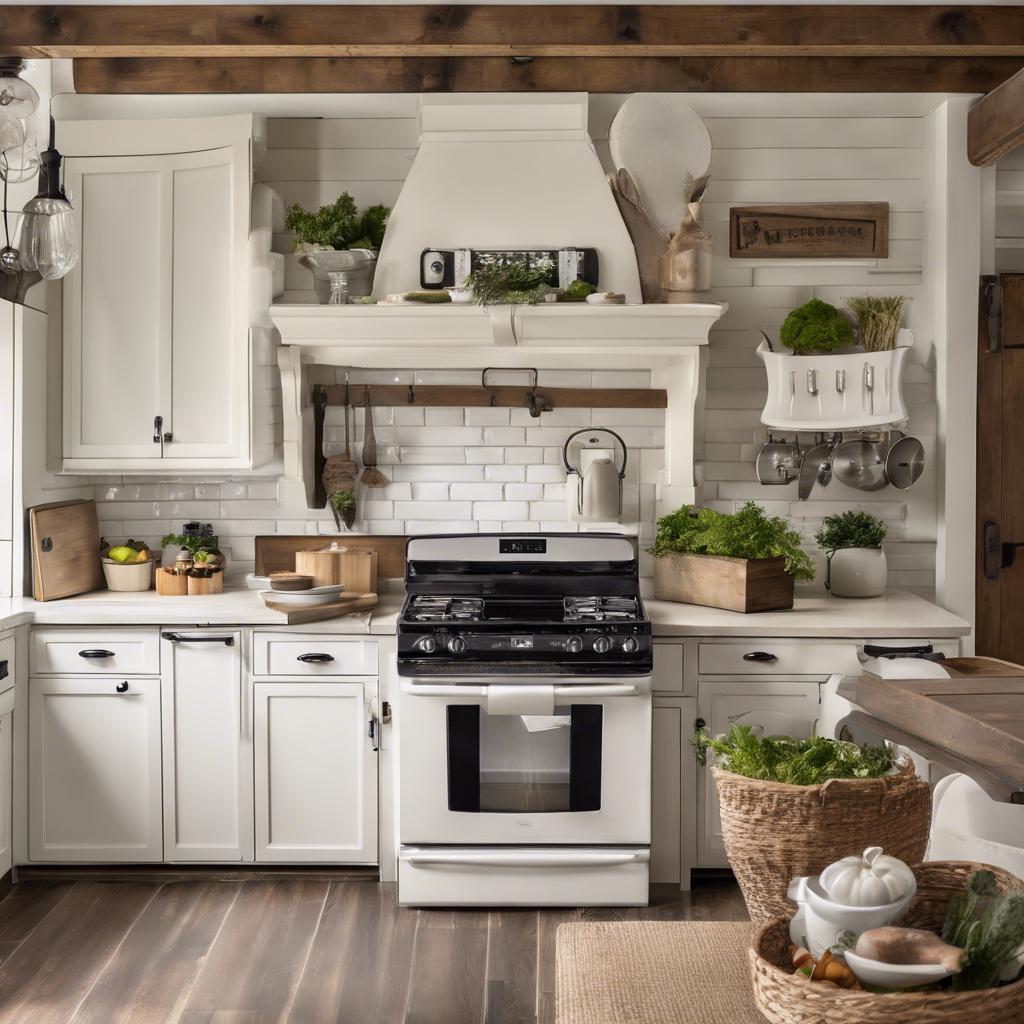
Infusing modern appliances into a farmhouse kitchen not only upgrades its functionality but also creates a delightful contrast with traditional aesthetics. Choosing appliances that feature stainless steel finishes or retro designs can bridge the gap between old-world charm and contemporary convenience. Consider items like:
- Smart Refrigerators: These offer advanced connectivity while maintaining a classic look.
- Induction Cooktops: They provide efficiency and speed without compromising the kitchen’s rustic vibe.
- Dishwashers with Custom Panels: These can be disguised to blend seamlessly with cabinetry.
To ensure that these modern additions do not detract from the overall design, it’s essential to think about color harmony and placement. For instance, a sleek range hood made from reclaimed wood can soften the look of a high-tech oven, while still delivering on performance. Moreover, creating a functional layout is key; consider a table that incorporates a modern island with calming hues against wood cabinetry. Below is a simple comparison of appliance styles to aid in decision-making:
| Appliance Style | Benefits | Ideal Pairing |
|---|---|---|
| Stainless Steel | Modern durability and easy cleaning | Wood and neutral tones |
| Retro | Nostalgic appeal with bold colors | Farmhouse sinks and vintage decor |
| Custom Paneled | Seamless integration into cabinetry | Traditional and farmhouse-style cabinets |
Accessorizing a Farmhouse Kitchen with Flair
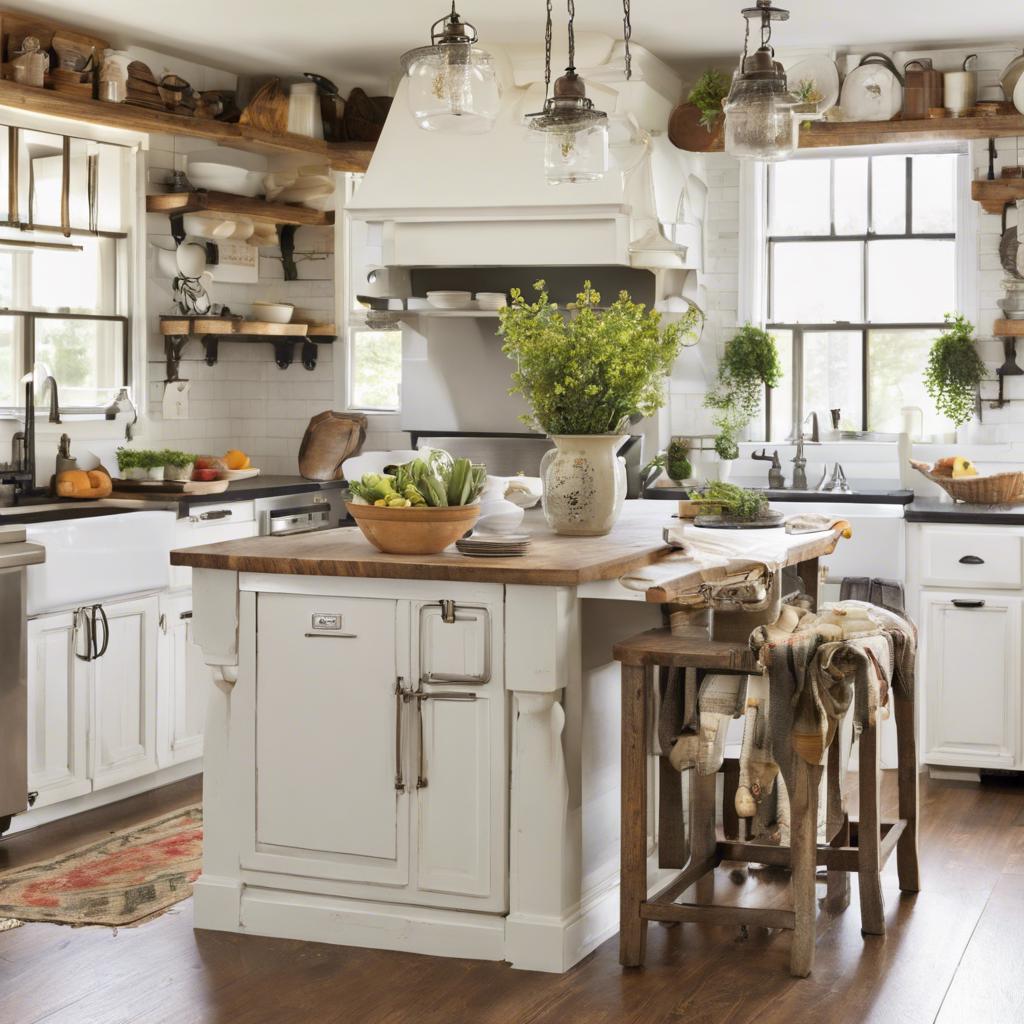
Bringing personality into a farmhouse kitchen can be as simple as selecting the right accessories. Start with vintage finds that tell a story. Think about incorporating unique pieces like an old-fashioned scale or a set of colorful Mason jars that can serve both function and decoration. Other noteworthy accessories include:
- Rustic Wooden Boards: Perfect for charcuterie displays or as serving trays.
- Textiles: Soft cotton dish towels or printed aprons can add vibrant color and texture.
- Farm-Inspired Art: Prints or signs featuring farm animals or fresh produce add character.
Next, consider how lighting can enhance the charm of your space. A statement pendant light over the island can become a focal point, while soft under-cabinet lighting can provide functionality without losing coziness. For a cohesive look, you can blend modern and traditional elements by keeping to a color palette that complements your farmhouse aesthetic. Here’s a simple table to illustrate this concept:
| Element | Style | Color Palette |
|---|---|---|
| Pendant Light | Industrial | Matte Black, Bronze |
| Centerpiece | Farmhouse | Neutral tones, Greenery |
| Wall Decor | Vintage | Pastels, White |
Farmhouse Kitchen Decor: Balancing Beauty and Utility
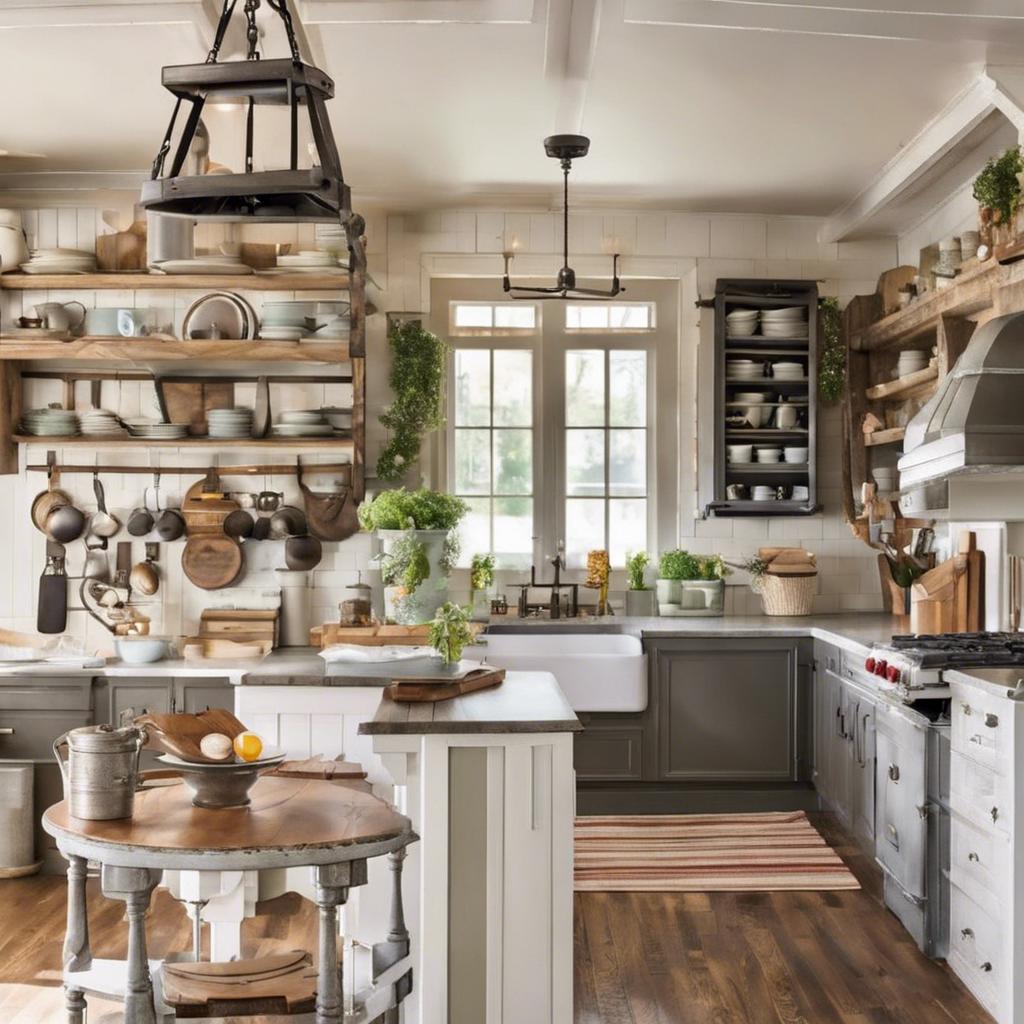
In a small farmhouse kitchen, the interplay of beauty and utility is vital to creating an inviting space that is also highly functional. Natural materials play a key role in achieving this balance, with reclaimed wood, rustic brick, and vintage tile bringing warmth and character. Incorporating open shelving allows for easy access to frequently used items while displaying charming pottery or heirloom dishware that adds aesthetic value. To further enhance practicality, consider multi-purpose furniture such as a kitchen island that doubles as both a prep area and casual dining spot, allowing the space to serve various needs without sacrificing style.
The color palette in these kitchens often leans towards soft, muted tones that evoke a sense of tranquility, allowing the natural textures and materials to shine. Accent pieces such as vintage light fixtures or handmade ceramics provide personality and charm without overwhelming the senses. Organizing tools and utensils in classic canisters or basket storage not only maintains a tidy space but also contributes to the decor. Here’s a quick overview of key elements that blend beauty and functionality:
| Element | Function | Beauty |
|---|---|---|
| Open Shelving | Easy access to kitchen essentials | Showcases decorative items |
| Vintage Light Fixtures | Illumination | Enhances rustic charm |
| Multi-Purpose Island | Prep and dining space | Stylish focal point |
| Natural Textures | Durability | Creates inviting ambience |
Crafting a Farmhouse Kitchen Garden for Fresh Ingredients
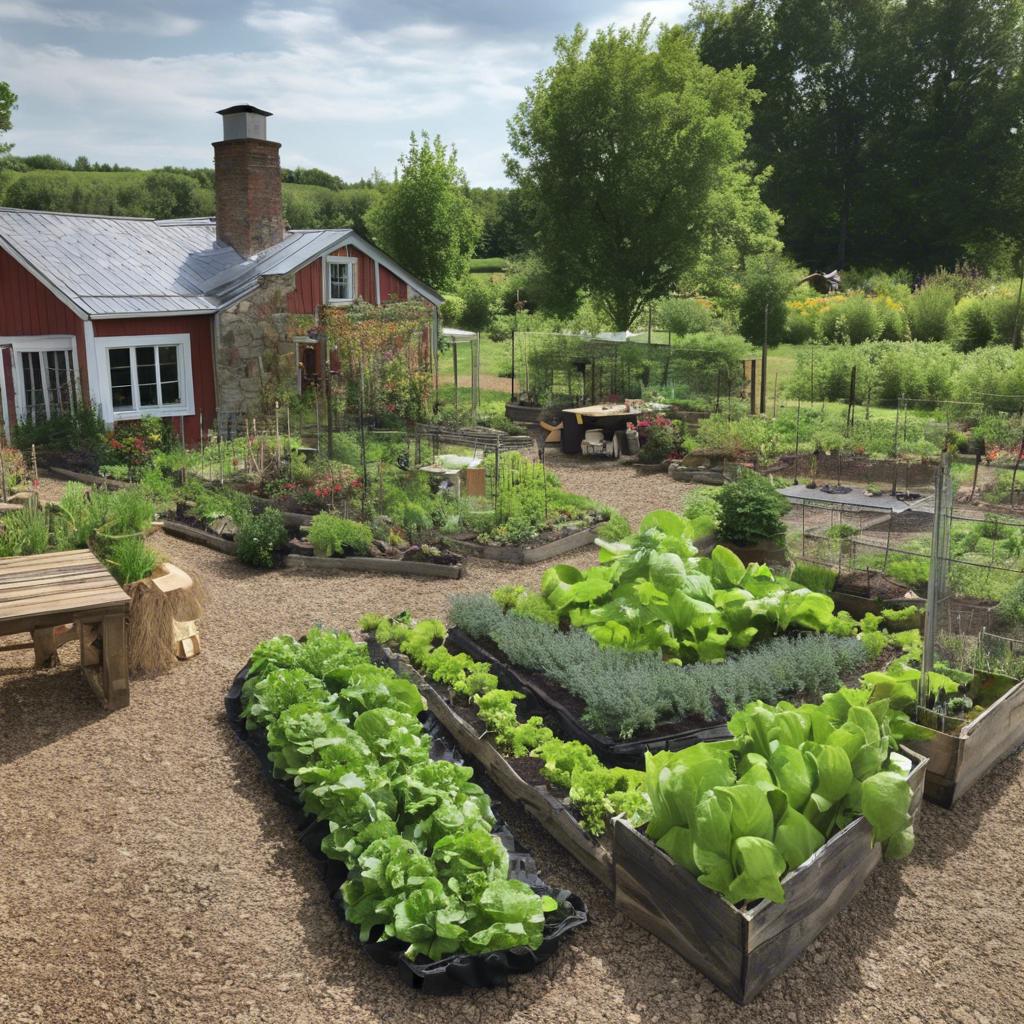
Imagine stepping out of your charming kitchen and into a space brimming with fresh herbs and vegetables that you nurtured right at home. Creating a kitchen garden not only enhances the aesthetic of your farmhouse kitchen but also provides you with ingredients that are just a step away. To make the most of your space, consider raised beds or vertical gardens that can easily fit in small areas while maximizing yield. A simple mix of basil, cilantro, rosemary, and cherry tomatoes can add vibrant colors and delightful aromas to your cooking.
When planning your garden, think about the layout and design that complements your kitchen’s style. A rustic wooden planter box or hanging pots can reflect the farmhouse vibe while being functional. Adding trellises for climbing plants, like peas and cucumbers, can not only save ground space but also add vertical interest to your garden area. Remember to incorporate a small seating area where you can relax and enjoy the fruits of your labor. Here’s a simple table with ideas for herbs and their culinary uses:
| Herb | Culinary Use |
|---|---|
| Basil | Pesto, salads, marinades |
| Cilantro | Salsas, curries, garnishes |
| Rosemary | Meats, breads, infusions |
| Mint | Teas, desserts, cocktails |
Tips for Maintaining a Cozy Atmosphere in a Farmhouse Kitchen
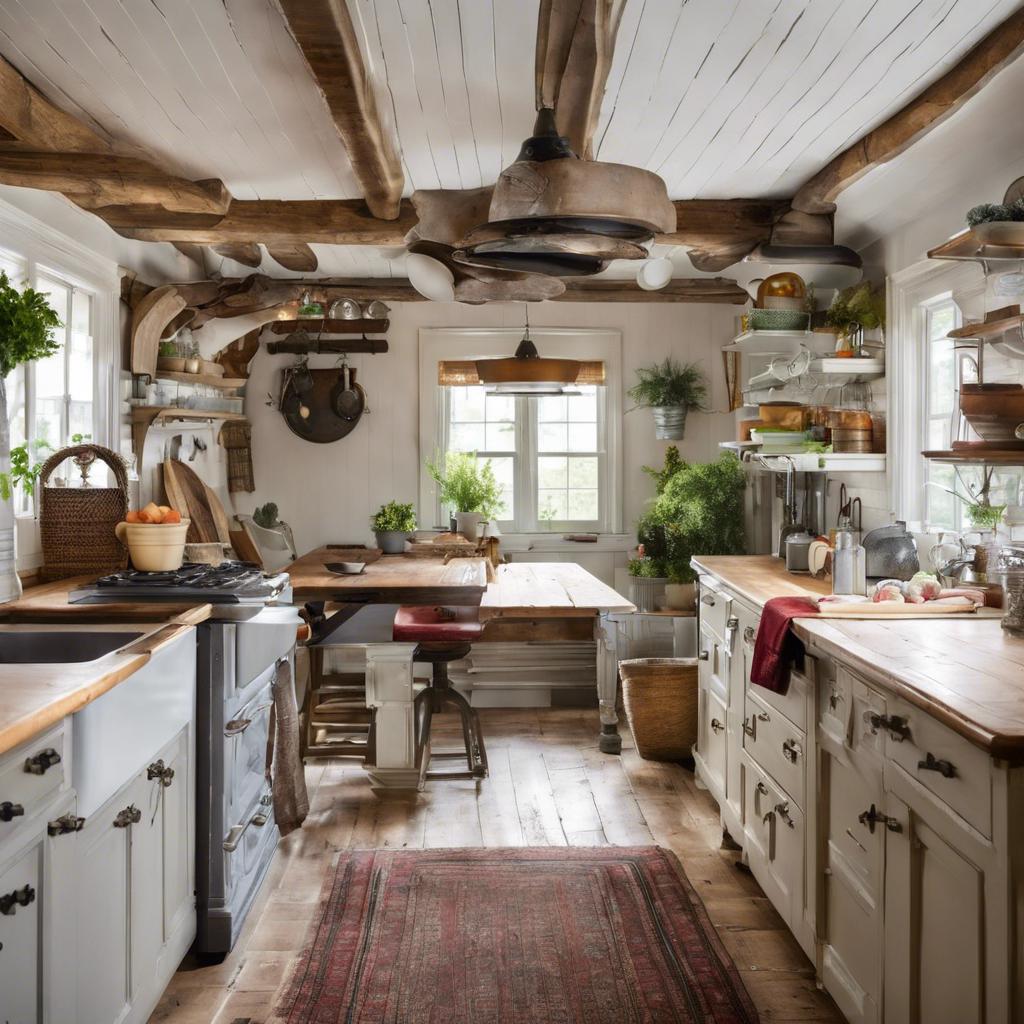
To cultivate a warm and inviting farmhouse kitchen, layering textures is essential. Incorporate soft textiles like a cozy throw blanket over a wooden chair, and use rattan baskets to store kitchen essentials. Consider installing shelves made from reclaimed wood to showcase artisanal kitchenware or your favorite cookbooks. Natural elements, such as potted herbs or a floral arrangement, add a refreshing touch. Don’t overlook the power of lighting; opt for warm pendant lights or vintage-inspired fixtures to create a soft glow that enhances the rustic charm.
Another way to enrich the atmosphere is by playing with color schemes and personal decor. Choose a palette that reflects warmth, such as earthy tones or muted pastels, which can instantly make the space feel more inviting. Personal touches, such as framed family photos or hand-painted ceramics, infuse character into your kitchen. Additionally, consider using an antique or distressed dining table as the centerpiece to encourage gatherings. Here are some suggestions for accessories that can contribute to the cozy vibe:
- Vintage Cookware: Adds charm and functionality.
- Handwoven Tablecloths: Softens the look of the dining area.
- Wooden Utensils: Enhances the rustic aesthetic.
- Seasonal Decor: Reflects the changing seasons for a refreshed look.
Designing a Farmhouse Kitchen for Entertaining
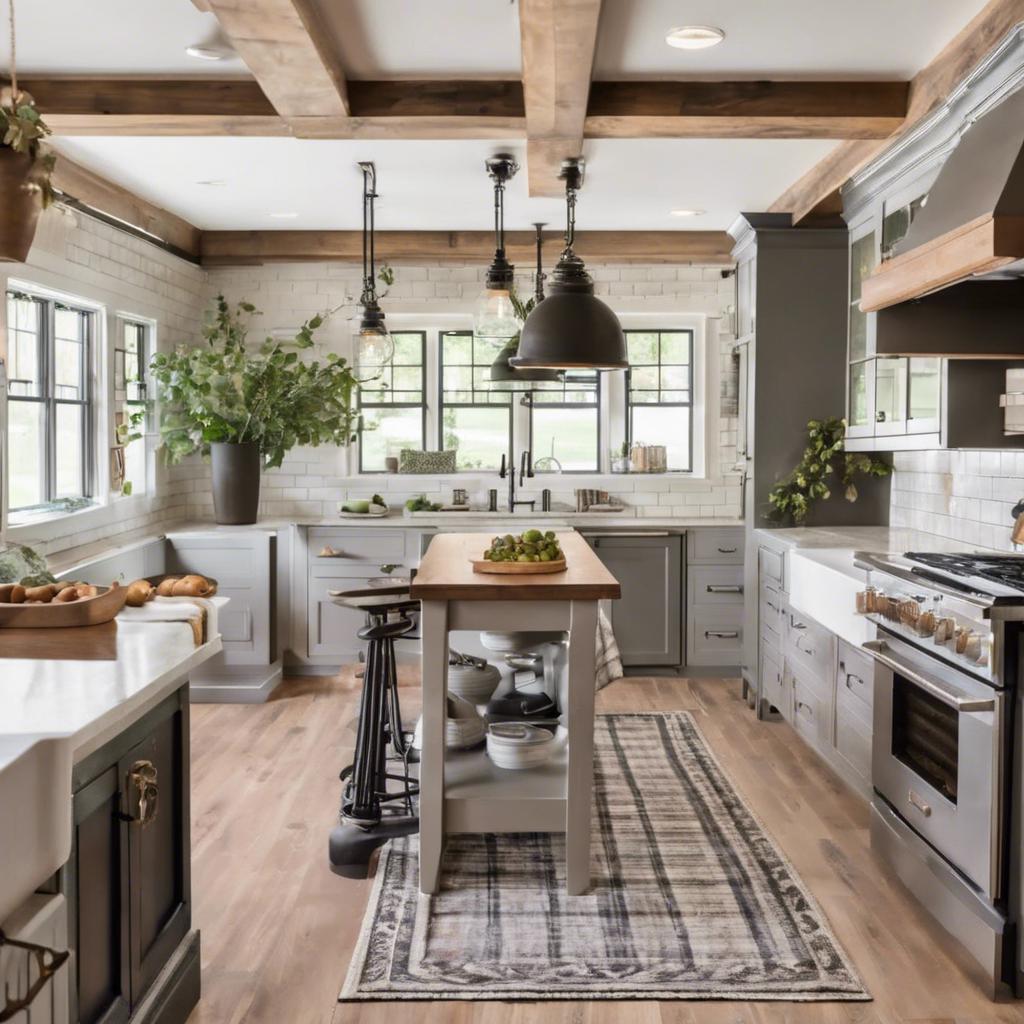
When designing a farmhouse kitchen that invites gathering and entertaining, it’s essential to focus on both warmth and functionality. Start by incorporating open layouts that allow a seamless flow between cooking and dining areas. Elements like a large farmhouse table not only serve as a dining space but also double as a prep area during larger cooking sessions. Consider adding strategically placed islands with barstools to provide extra seating and create a more inclusive atmosphere. This arrangement encourages conversation and engagement, making it easier for hosts to interact with guests while preparing meals.
In terms of aesthetics, embracing natural materials and colors is key for achieving that charming farmhouse vibe. Select cabinetry in soft, muted tones, and opt for reclaimed wood elements to add character. Complement these choices with textured fabrics like linen for curtains and cozy cushions. Accessories play a significant role as well; incorporate vintage dishware and rustic decor to create a personal touch. Consider using a central focal point, such as a vintage sideboard or a unique light fixture, to draw the eye and enhance the overall ambiance. To keep everything organized and functional, you might find it helpful to utilize a carefully designed table for tracking ingredients and menus during gatherings:
| Essential Elements | Purpose |
|---|---|
| Large Dining Table | Gathering place for meals and conversation |
| Island with Barstools | Extra seating and informal dining option |
| Reclaimed Wood Features | Adds warmth and character |
| Vintage Accessories | Personal touches that reflect style |
Exploring the Influence of Farmhouse Kitchens in Modern Homes
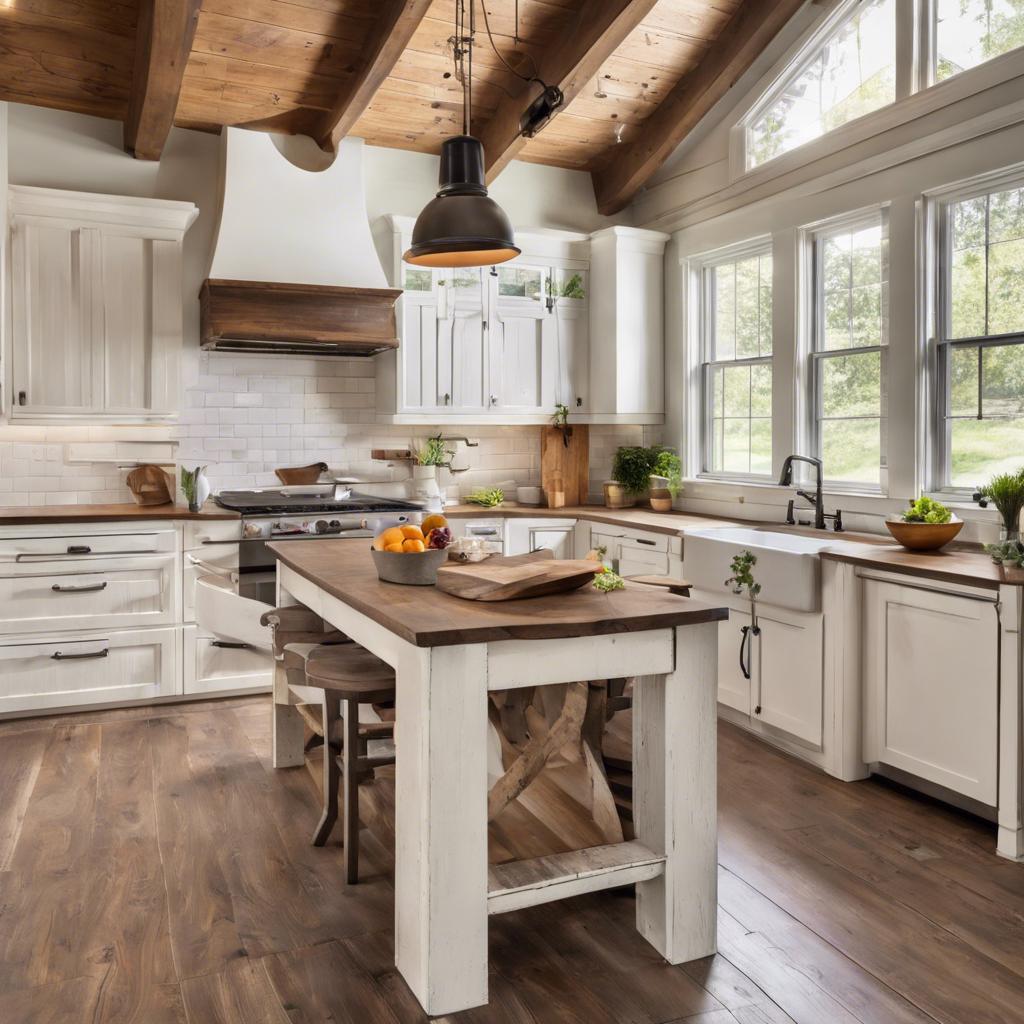
The farmhouse kitchen has become a beacon of warmth and charm, seamlessly integrating the essence of rustic life into modern homes. This style is marked by its natural materials, simple lines, and functional design, which create an inviting atmosphere that feels both stylish and down-to-earth. Homeowners are increasingly drawn to elements such as reclaimed wood beams, farmhouse sinks, and open shelving that not only serve aesthetic purposes but also enhance the kitchen’s utility. This blend of style and function resonates particularly well in small spaces, where maximizing both can lead to a cozy and efficient culinary haven.
In designing these intimate kitchens, it’s essential to prioritize features that capture the essence of the farmhouse aesthetic while ensuring ease of use. Popular elements include:
- Warm Color Palettes: Soft whites, muted greens, and earthy browns contribute to a soothing environment.
- Vintage Appliances: Retro-inspired designs bring character, while modern efficiency ensures functionality.
- Textured Fabrics: Linen aprons, cotton towels, and woolen throws add layers of comfort and style.
To illustrate the various appealing aspects of a small farmhouse kitchen, consider this table highlighting key design elements:
| Design Element | Description |
|---|---|
| Farmhouse Sink | Deep and wide to manage pots and pans easily. |
| Open Shelving | Showcases dishware and decor while saving space. |
| Accent Lighting | Hanging pendant lights and warm bulbs enhance warmth. |
Q&A
Q&A: Charming Small Farmhouse Kitchens – A Blend of Style and Function
Q1: What defines the charm of a small farmhouse kitchen?
A1: The charm of a small farmhouse kitchen often lies in its rustic character and functional simplicity. Features like exposed beams, vintage appliances, and handcrafted elements create a warm, welcoming atmosphere. The use of natural materials, such as wood and stone, alongside soft, muted colors, helps evoke the spirit of countryside living.
Q2: How can one maximize space in a small farmhouse kitchen?
A2: To maximize space, consider multifunctional furniture, like an island that doubles as a dining area or a potting bench with storage. Open shelving not only keeps essentials accessible but also allows for decorative displays. Incorporating smart storage solutions such as pull-out cabinets and under-sink organizers can significantly enhance both usability and comfort in smaller kitchens.
Q3: What color palettes are popular in farmhouse kitchens?
A3: Popular color palettes in farmhouse kitchens typically feature soft whites, muted greens, and earthy tones. These colors create a peaceful environment while allowing for occasional pops of color through accessories or seasonal décor. Light, airy shades can make the kitchen feel larger, whereas deeper hues can add depth and coziness.
Q4: Are there specific materials that work best in these kitchens?
A4: Yes, materials that reflect the farmhouse aesthetic are ideal. Think of reclaimed wood for cabinetry or countertops, vintage-inspired tiles for backsplashes, and enamel or cast iron for cookware. These choices not only enhance durability but also contribute to the overall character and warmth of the space.
Q5: What role does lighting play in the design of a small farmhouse kitchen?
A5: Lighting is crucial in creating the right ambiance in a small farmhouse kitchen. A combination of natural light, pendant lights, and under-cabinet fixtures can make the area feel inviting. Rustic chandeliers or lantern-style fixtures can serve as focal points while providing functional illumination, enhancing both style and practicality.
Q6: How can one incorporate modern conveniences into a farmhouse kitchen without losing its charm?
A6: Blending modern conveniences with farmhouse charm can be achieved through thoughtful design choices. Consider integrated appliances that maintain the kitchen’s sleek appearance or smart home technology that complements the old-world feel. Using cabinetry that conceals modern appliances ensures that aesthetics remain intact while boosting functionality.
Q7: Can you suggest some décor ideas to enhance the farmhouse feel?
A7: To enhance the farmhouse feel, consider incorporating farmhouse-style décor such as vintage signs, mason jar centerpieces, and framed botanical prints. Displaying heirloom dishware or rustic utensils can provide both functionality and a personal touch. Additionally, adding greenery through potted herbs or hanging plants can bring the outdoors inside, enhancing that charming, cottage-like atmosphere.
Q8: What are some common mistakes to avoid when designing a small farmhouse kitchen?
A8: One common mistake is overcrowding the space with too many decorative items, which can overwhelm the kitchen’s charm. Additionally, skipping on functional layout design can hinder workflow. It’s essential to balance style with practicality while ensuring that each element contributes to the overall harmony of the kitchen without sacrificing its functionality.
Q9: What is a standout feature that can elevate the design of a small farmhouse kitchen?
A9: A standout feature such as a farmhouse sink can greatly elevate the design. Its understated elegance and practicality embody the essence of farmhouse living. Choosing a statement faucet or unique tile pattern can also add personality while serving as visually striking focal points within the space.
Q10: How can one personalize a small farmhouse kitchen?
A10: Personalizing a small farmhouse kitchen can be achieved through curated collections, such as vintage cookware or family heirlooms displayed on shelves. Custom accents like hand-painted signs or personalized cutting boards can also infuse personal history into the design. Incorporating unique textiles, such as checked tablecloths or homemade curtains, can further enhance the space’s charm and individuality.
The Conclusion
As we draw the curtains on our exploration of charming small farmhouse kitchens, it’s clear that these spaces are more than just a backdrop for meal preparation; they are a celebration of simplicity, warmth, and functionality. Infused with personal touches and timeless details, each kitchen tells its own story while standing as a testament to the enduring appeal of farmhouse design.
In a world that often leans toward the sleek and modern, these kitchens remind us that style need not come at the expense of comfort or practicality. Whether it’s the rustic charm of worn wood, the cheerful hues of vintage ceramics, or the soft glow of pendant lighting, small farmhouse kitchens encapsulate a harmonious blend of aesthetics and utility—a sanctuary where culinary creativity thrives and memories are made.
So as you consider your own kitchen space, remember that embracing the farmhouse ethos doesn’t mean shackling yourself to tradition. Instead, it offers an open invitation to weave your personality into the fabric of your home. May you find inspiration in the warmth and character of these delightful kitchens, and may your own culinary adventures be ever enriched by the style and functionality that farmhouse designs uniquely provide.
